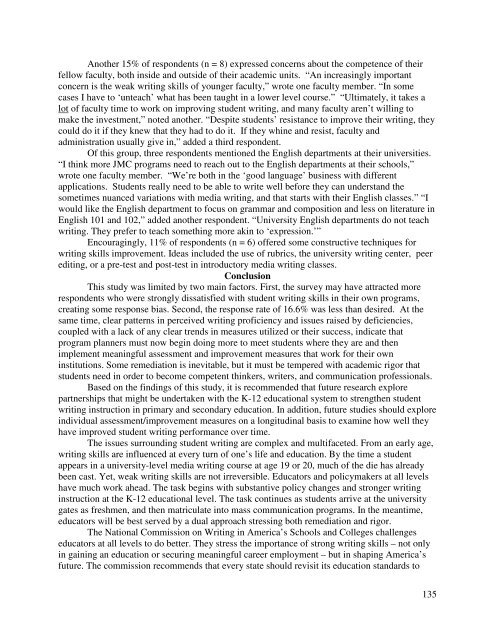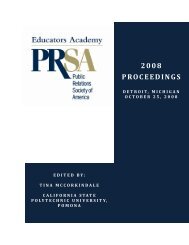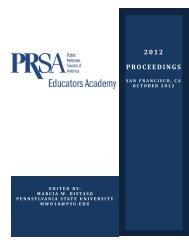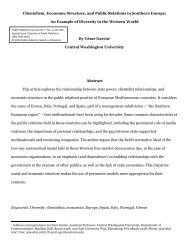2010 - Public Relations Society of America
2010 - Public Relations Society of America
2010 - Public Relations Society of America
Create successful ePaper yourself
Turn your PDF publications into a flip-book with our unique Google optimized e-Paper software.
Another 15% <strong>of</strong> respondents (n = 8) expressed concerns about the competence <strong>of</strong> their<br />
fellow faculty, both inside and outside <strong>of</strong> their academic units. “An increasingly important<br />
concern is the weak writing skills <strong>of</strong> younger faculty,” wrote one faculty member. “In some<br />
cases I have to ‘unteach’ what has been taught in a lower level course.” “Ultimately, it takes a<br />
lot <strong>of</strong> faculty time to work on improving student writing, and many faculty aren’t willing to<br />
make the investment,” noted another. “Despite students’ resistance to improve their writing, they<br />
could do it if they knew that they had to do it. If they whine and resist, faculty and<br />
administration usually give in,” added a third respondent.<br />
Of this group, three respondents mentioned the English departments at their universities.<br />
“I think more JMC programs need to reach out to the English departments at their schools,”<br />
wrote one faculty member. “We’re both in the ‘good language’ business with different<br />
applications. Students really need to be able to write well before they can understand the<br />
sometimes nuanced variations with media writing, and that starts with their English classes.” “I<br />
would like the English department to focus on grammar and composition and less on literature in<br />
English 101 and 102,” added another respondent. “University English departments do not teach<br />
writing. They prefer to teach something more akin to ‘expression.’”<br />
Encouragingly, 11% <strong>of</strong> respondents (n = 6) <strong>of</strong>fered some constructive techniques for<br />
writing skills improvement. Ideas included the use <strong>of</strong> rubrics, the university writing center, peer<br />
editing, or a pre-test and post-test in introductory media writing classes.<br />
Conclusion<br />
This study was limited by two main factors. First, the survey may have attracted more<br />
respondents who were strongly dissatisfied with student writing skills in their own programs,<br />
creating some response bias. Second, the response rate <strong>of</strong> 16.6% was less than desired. At the<br />
same time, clear patterns in perceived writing pr<strong>of</strong>iciency and issues raised by deficiencies,<br />
coupled with a lack <strong>of</strong> any clear trends in measures utilized or their success, indicate that<br />
program planners must now begin doing more to meet students where they are and then<br />
implement meaningful assessment and improvement measures that work for their own<br />
institutions. Some remediation is inevitable, but it must be tempered with academic rigor that<br />
students need in order to become competent thinkers, writers, and communication pr<strong>of</strong>essionals.<br />
Based on the findings <strong>of</strong> this study, it is recommended that future research explore<br />
partnerships that might be undertaken with the K-12 educational system to strengthen student<br />
writing instruction in primary and secondary education. In addition, future studies should explore<br />
individual assessment/improvement measures on a longitudinal basis to examine how well they<br />
have improved student writing performance over time.<br />
The issues surrounding student writing are complex and multifaceted. From an early age,<br />
writing skills are influenced at every turn <strong>of</strong> one’s life and education. By the time a student<br />
appears in a university-level media writing course at age 19 or 20, much <strong>of</strong> the die has already<br />
been cast. Yet, weak writing skills are not irreversible. Educators and policymakers at all levels<br />
have much work ahead. The task begins with substantive policy changes and stronger writing<br />
instruction at the K-12 educational level. The task continues as students arrive at the university<br />
gates as freshmen, and then matriculate into mass communication programs. In the meantime,<br />
educators will be best served by a dual approach stressing both remediation and rigor.<br />
The National Commission on Writing in <strong>America</strong>’s Schools and Colleges challenges<br />
educators at all levels to do better. They stress the importance <strong>of</strong> strong writing skills – not only<br />
in gaining an education or securing meaningful career employment – but in shaping <strong>America</strong>’s<br />
future. The commission recommends that every state should revisit its education standards to<br />
135
















